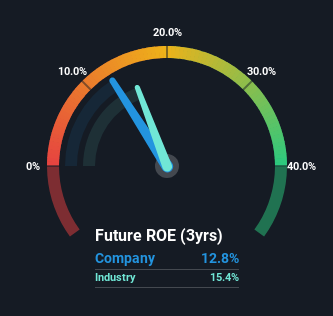While some investors are already well versed in financial metrics (hat tip), this article is for those who would like to learn about Return On Equity (ROE) and why it is important. To keep the lesson grounded in practicality, we’ll use ROE to better understand International Game Technology PLC (NYSE:IGT).
Return on equity or ROE is a key measure used to assess how efficiently a company’s management is utilizing the company’s capital. Put another way, it reveals the company’s success at turning shareholder investments into profits.
View our latest analysis for International Game Technology
How Do You Calculate Return On Equity?
The formula for return on equity is:
Return on Equity = Net Profit (from continuing operations) ÷ Shareholders’ Equity
So, based on the above formula, the ROE for International Game Technology is:
13% = US$251m ÷ US$2.0b (Based on the trailing twelve months to September 2023).
The ‘return’ is the yearly profit. Another way to think of that is that for every $1 worth of equity, the company was able to earn $0.13 in profit.
Does International Game Technology Have A Good ROE?
Arguably the easiest way to assess company’s ROE is to compare it with the average in its industry. The limitation of this approach is that some companies are quite different from others, even within the same industry classification. You can see in the graphic below that International Game Technology has an ROE that is fairly close to the average for the Hospitality industry (15%).
That isn’t amazing, but it is respectable. Although the ROE is similar to the industry, we should still perform further checks to see if the company’s ROE is being boosted by high debt levels. If so, this increases its exposure to financial risk. To know the 3 risks we have identified for International Game Technology visit our risks dashboard for free.
How Does Debt Impact Return On Equity?
Most companies need money — from somewhere — to grow their profits. That cash can come from retained earnings, issuing new shares (equity), or debt. In the first and second cases, the ROE will reflect this use of cash for investment in the business. In the latter case, the debt required for growth will boost returns, but will not impact the shareholders’ equity. Thus the use of debt can improve ROE, albeit along with extra risk in the case of stormy weather, metaphorically speaking.
International Game Technology’s Debt And Its 13% ROE
It’s worth noting the high use of debt by International Game Technology, leading to its debt to equity ratio of 2.95. While its ROE is pretty respectable, the amount of debt the company is carrying currently is not ideal. Investors should think carefully about how a company might perform if it was unable to borrow so easily, because credit markets do change over time.
Conclusion
Return on equity is useful for comparing the quality of different businesses. A company that can achieve a high return on equity without debt could be considered a high quality business. If two companies have around the same level of debt to equity, and one has a higher ROE, I’d generally prefer the one with higher ROE.
But ROE is just one piece of a bigger puzzle, since high quality businesses often trade on high multiples of earnings. It is important to consider other factors, such as future profit growth — and how much investment is required going forward. So you might want to check this FREE visualization of analyst forecasts for the company.
But note: International Game Technology may not be the best stock to buy. So take a peek at this free list of interesting companies with high ROE and low debt.
Valuation is complex, but we’re helping make it simple.
Find out whether International Game Technology is potentially over or undervalued by checking out our comprehensive analysis, which includes fair value estimates, risks and warnings, dividends, insider transactions and financial health.
View the Free Analysis
Have feedback on this article? Concerned about the content? Get in touch with us directly. Alternatively, email editorial-team (at) simplywallst.com.
This article by Simply Wall St is general in nature. We provide commentary based on historical data and analyst forecasts only using an unbiased methodology and our articles are not intended to be financial advice. It does not constitute a recommendation to buy or sell any stock, and does not take account of your objectives, or your financial situation. We aim to bring you long-term focused analysis driven by fundamental data. Note that our analysis may not factor in the latest price-sensitive company announcements or qualitative material. Simply Wall St has no position in any stocks mentioned.
